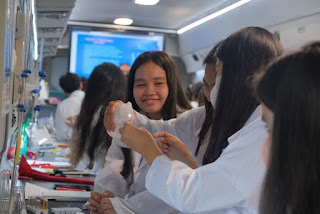When the NuLab:STEM in Motion bus of the Department of Science and Technology - Science Education Institute arrived in the rural town of San Rafael, Bulacan last February 27, the students of Maronquillo National High School did not expect they were going to take off to an exciting and fun-filled science adventure.
Unlike the Science Explorer which visited them in 2015, the bright, yellow-colored bus is more spacious, mimicking a science laboratory set-up and is equipped with more interactive and state-of-the art facilities. It caters primarily to senior high school students with advanced science, technology, engineering, and mathematics (STEM) modules focusing on science and technology careers facilitated by the country’s top scientists and experts.
In one session, students were amazed as they explored the unseen world of microbes. The module, discussed by University of the Philippines Diliman Assistant Professor Mark Tolentino, was an introduction to microbiology and allowed the students to use a microscope for the first time.
Caption: A Grade 11 student attentively observed the specimen under a microscope as they began their activity for the microbiology session.
Another STEM session enjoyed by the learners was the chemistry experiment about light and colors facilitated by Ms. Michelle Macalingmot of the Philippines Science High School. Using the provided colorimeter, students were able to identify the amount of light absorbed by the different given solutions.
Caption: A group of Grade 12 students pouring distilled water into the test tubes for their experiment during the chemistry session.
Meanwhile, the sky viewing and astronomy session by Mr. Lordnico Mendoza of DOST-PAGASA is a favorite among students and teachers as they got the chance to have a glimpse of the moon, planet Jupiter and different constellations through the telescopes installed by the NuLab team. Inside the bus, the students were also excited as they virtually traveled around the world and outer space using an astronomy software called Stellarium.
Caption: A student having a glimpse of the moon during the sky viewing held last February 27 at the school grounds of Maronquillo National High School.
Caption: Grade 11 and Grade 12 STEM students took a picture inside the NuLab bus after the astronomy session with Mr. Lordnico Mendoza.
Within the four-day visit of NuLab in Maronquillo, around 250 junior and senior high school students discovered their potential in STEM.
“Marami akong natutunan at higit sa lahat kami ay nag-enjoy sa mga activities. We are so grateful that you are willing to help students to become interested in science and for giving us the opportunity to be part of this program,” said Clariza Valderama, a Grade 11 student in the ABM strand who now considers taking a STEM related course in college.
Caption: Grade 10 students pose for a group photo with chemistry module facilitator Ms. Michelle Macalingmot outside the NuLab bus.
The NuLab bus was first launched in 2019 and aims to bring science closer to the youth, especially in rural areas. After a two-year pandemic hiatus, it went back again to the road in 2022 and since then, it has been traveling to schools in underserved areas to provide students with access to quality science education.
“Our goal is to extend our service to the grassroots level and ultimately, make our students choose science as an area of study when they reach college and later as a career. We hope that through this project, you’ll get to start a path in S&T,” shared Mr. Randolf Sasota, Officer-in-Charge of DOST-SEI Science Technology Manpower Education and Research Promotion Division.
Aside from the STEM sessions aboard the NuLab bus, students were also given an orientation on the various scholarships that DOST-SEI offers to incoming college students through the #Push4Science: Maging DOST scholar ka! Campaign.
Through the students’ experience inside the NuLab and #Push4Science campaign, DOST-SEI is hopeful that more students are inspired to be future engineers, scientists, inventors, and innovators who will help contribute to the country’s development.
“With the scholarships that the Institute is offering, we hope to develop and produce a world-class S&T human resource as this is an important component of our socio-economic development. As long as there are students who show interest and potential to become S&T professionals, DOST-SEI shall remain committed to provide them opportunities to reach their dreams,” DOST-SEI Director Dr. Josette Biyo said in a statement.
Caption: Students inside the bus also get an orientation on the undergraduate scholarships offered by DOST-SEI through the #Push4Science: Maging DOST Scholar Ka! Campaign.
The NuLab bus is scheduled to visit more public high schools in the Camarines Norte, Camarines Sur, and Bohol in the succeeding months.




























 Ross is known as the Pambansang Blogger ng Pilipinas - An Information and Communication Technology (ICT) Professional by profession and a Social Media Evangelist by heart.
Ross is known as the Pambansang Blogger ng Pilipinas - An Information and Communication Technology (ICT) Professional by profession and a Social Media Evangelist by heart.











